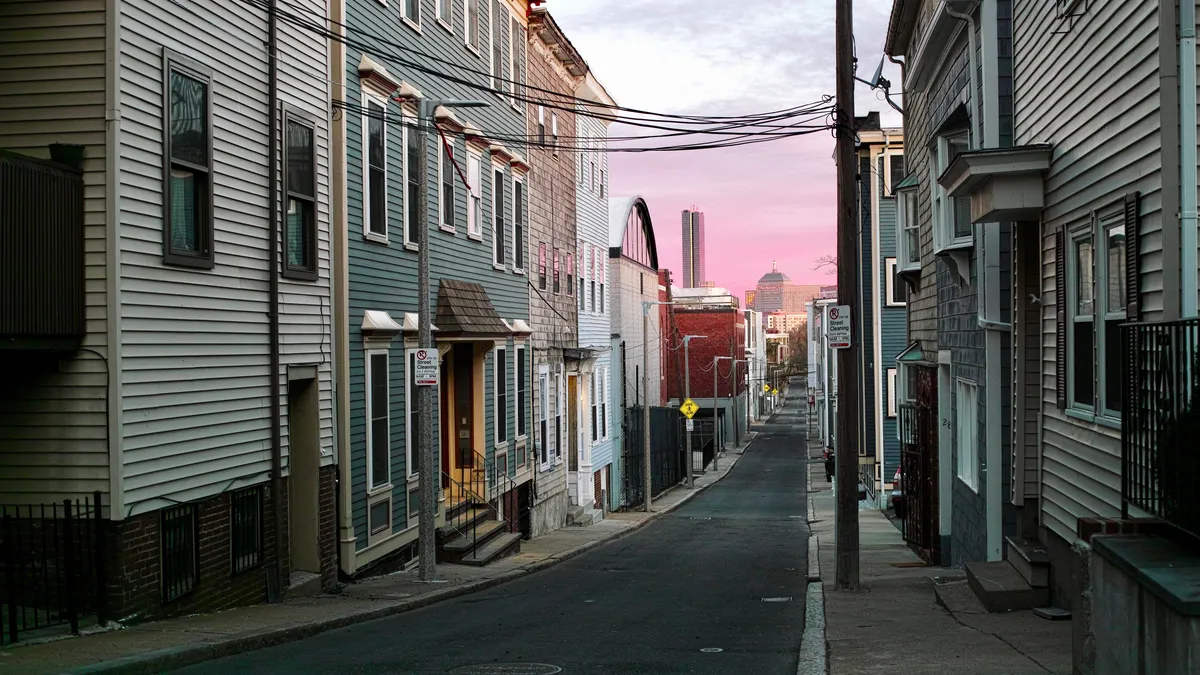Dive Brief:
- A majority of Boston residents will receive electricity via a new supplier starting Monday, the culmination of a years-in-the-making Community Choice Electricity program developed by the City of Boston Environment Department and partners.
- The opt-out program leverages Boston's collective buying power in a bid to deliver greener, locally sourced and more affordable electricity to customers — appealing to some consumer protection groups and environmental justice advocates alike.
- The initiative is one piece of Boston's strategy to be carbon neutral come 2050, in conjunction with other efforts such as improving access to electric vehicle (EV) sharing and charging in the lead up to 2030 and developing carbon targets for existing buildings — the city's greatest source of community emissions at 71%.
Dive Insight:
Boston's new setup is an example of a community choice aggregation (CCA), or municipal aggregation, program. The model allows a local government to procure electric power for constituents from an alternative supplier — that may offer competitive pricing, and more local and renewable sourcing — but still deliver service from the existing utility provider.
"It is one of the bigger projects that we've undertaken as a city, we have over 200,000 customers," said Dave Musselman, the city's director of the municipal energy unit. "We wanted to make sure we were being very thoughtful about how we did it, because you kind of get one shot to get it right."
Massachusetts was the first state to pass legislation authorizing CCAs in 1997, and the Cape Light Compact CCA was formed in 2000.
With CCA regulations differing between California and Massachusetts due to differing energy needs, those California programs weren't the most applicable models for Boston to turn to as it developed its own, experts say. But one area of overlap is the opt-out nature of the programs, which has proved to be a big advantage in California, said energy development attorney Seth Hilton, a partner at Stoel Rives. In California, "you've seen very low opt-out rates — about 90% or more of load in a particular area being transferred over to CCAs."
And that shift has resulted in a notable level of renewable energy procurement beyond what the state required. According to a recent report from the UCLA Luskin Center for Innovation, the renewable energy that California CCAs purchased from 2011 to 2019 was more than twice that of state minimums.
"It's a pretty dramatic shift from what we've traditionally done in terms of electric procurement," said Hilton. "But there's a lot of support for the idea that these local entities can make decisions about what they're going to procure."
CCAs have only gotten the green light from nine states total, a list that includes Illinois, New York, Rhode Island, New Hampshire and Virginia, but the latter two don't have any yet in operation. Legislators in Arizona, Colorado, Connecticut, Maryland and Oregon are considering opening their states to the programs.
Residents of Boston had a multi-month period in which they could elect to continue with their existing plan. For those rolling onto the new program, there are three service options.
On the default option, residents receive a 10% higher proportion of their electricity from renewable sources compared to Massachusetts' minimum required standard for renewable energy portfolio, or 28% renewable sourcing in total. Based on calculations assuming average household electricity consumption of 600 kWh per month, that plan would cost users $2.84 less per month than the previously available plan, the Boston Environment Department confirmed.
Residents can also manually select a slightly cheaper option that simply matches that standard, or pay a few cents more per kWh per month (which adds up to roughly $17.29 more) to receive electricity from 100% renewable sources. The Boston Environment Department could not share exact estimates on how many customers selected each of the three options, but said approximately 216,000 accounts will be enrolled in the overall program at its outset Monday.
The process of developing that whole system began in late 2017 when the Boston City Council ordered an investigation into the merits of such a program. The Environment Department solicited a consultant to create a plan, formed a working group with different community leaders and residents, and filed a plan in the summer of 2019 that was approved approximately a year later. Through an RFP process, Boston selected Constellation NewEnergy as its supplier.
Among the cities that Musselman and team consulted was Cincinnati, Ohio. Ohio has become a Midwest beacon for the model; Cleveland also has a CCA program and Columbus this past November decided to pursue one.
Outgoing Boston Mayor Marty Walsh, the recently replaced chair of Climate Mayors, is President Joe Biden's pick to lead the Department of Labor. Walsh highlighted the Community Choice Electricity program in the 2021 State of the City address. Other sustainability initiatives pushed during what would be the last months of Walsh's tenure include the September announcement of an RFP to help develop an urban forest plan, and the November release of a zero-emission vehicles roadmap, which envisions an EV car-share or charging station within a 10-minute walk of every Boston household.
Separately, the Biden administration last week issued a series of climate-centered executive orders, including a target for 100% clean electricity by 2035 and full electrification of the federal fleet.
Correction: A previous version of this article incorrectly identified the first CCA established in the United States.
















